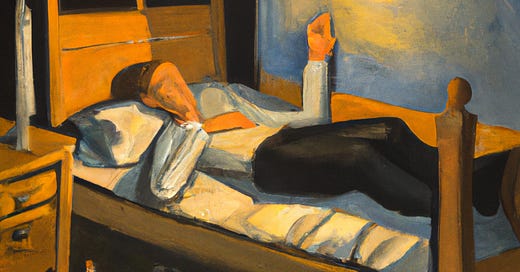Come Sleep! O Sleep, the certain knot of peace, The baiting-place of wit, the balm of woe, The poor man's wealth, the prisoner's release, Th' indifferent judge between the high and low. With shield of proof shield me from out the prease Of those fierce darts despair at me doth throw: O make in me those civil wars to cease; I will good tribute pay, if thou do so. Take thou of me smooth pillows, sweetest bed, A chamber deaf to noise and blind to light, A rosy garland and a weary head: And if these things, as being thine by right, Move not thy heavy grace, thou shalt in me, Livelier than elsewhere, Stella's image see.
Even prior to its meaning, these 14 lines sound wonderful. Take a moment to read it out loud, slowly. Between the rhyme scheme and the in line sound devices it rolls of the tongue and rings in the ear. Most of Sidney’s sonnets sound stunning, so if you enjoy his snappy cadence and turn of syllable feel free to check out this link.
This particular poem is part of a larger work called Astrophil and Stella, which is a collection of love sonnets from Astrophil (Greek for “star-lover) to Stella (Latin for “star”). But this poem isn’t overly concerned with Stella, it is a cry for the peace of sleep.
Why would Astrophil long for sleep? It is the “poor man’s wealth” and “the prisoners release” and “the balm of woe”. Sidney claims here that sleep is the temporary end of negative experiences. It isn’t a good, but it also isn’t a bad and the end of bad is good enough for some. There may be a distinction to make here between sleep and rest. Rest may be fundamentally good while sleep is merely neutral. Yet neutral is particularly nice if you live with “civil wars” in your head. Astrophil would give “good tribute” to make the conflict within him cease. He would offer Sleep all that is Sleep’s by right, and even offer up his dreams. For it is in his dreams that he sees Stella, in his dreams Stella is “livelier than elsewhere”.
Perhaps simply not experiencing pain is enough. Perhaps the joys of a dream are enough. Perhaps the end of the negative and the hope of the positive is enough.
But then again, perhaps it isn’t enough.
There are just a few hints that sleep is not quite the panacea that most of the lines of the poem imagine it to be. Why would Sidney call sleep a “heavy grace”. What does it mean to be heavy? Something heavy would be hard to hold, or perhaps a heavy thing would require you to put down anything else you are holding in order to pick it up. And yes, that means you will put down “despair” and “civil wars”, but what else are you required to put down? It is interesting that Stella is “livelier than elsewhere” if sleep would come to Astrophil. So in his dreams, Stella is present and lively and full of joy. But she isn’t that way when he is awake. And time spent with dream Stella will do nothing to further his relationship with real Stella. Sleep will take more than “smooth pillows and sweetest bed”. When you are sleeping, you can’t impact or change the world.
So yes, when we sleep we are relieved of our negative experiences. But we are also robbed of our agency. What price should we pay to numb the pain? What “good tribute” is appropriate? Should we give up our dreams, as Astrophil does?
Astrophil and Stella doesn’t end very happily. The love between them remains merely an unreciprocated dream of Astrophil. Perhaps we need the “fierce darts of despair” to prod us along our path. Perhaps in a “chamber deaf to noise and blind to light” growth is impossible. Perhaps the grace of sleep is too heavy a grace.




